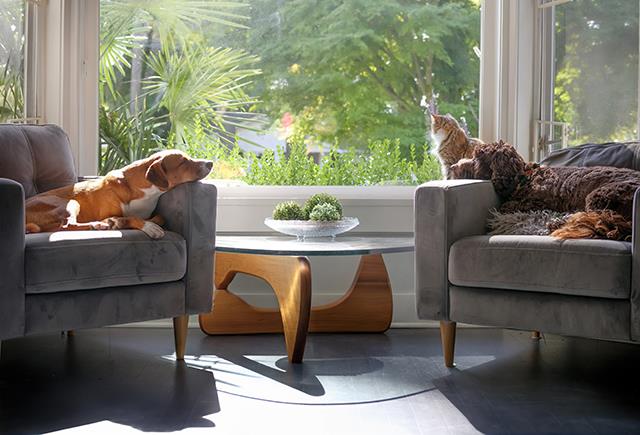Keeping pets indoors may impact the resale value of the property if the home is not kept in good condition. To safeguard the investment value of the home, owners will need to consider ways to keep a pet indoors without causing any lasting damage to the property.

READ: Create a pet-friendly garden and add value to your property
Adrian Goslett, Regional Director and CEO of RE/MAX of Southern Africa, suggests that, depending on the condition of the home, keeping a pet indoors could either be a drawcard or a deterrent for potential buyers.
“Because pet-friendly apartments and townhouses are so tricky to come by, knowing that the seller comfortably kept a pet in the home could make the property more appealing to pet-owning buyers. However, if the home is noticeably damaged by the pets, this could be off-putting to buyers, especially for those without pets,” Goslett explains.
To help pet-owning homeowners protect the resale value of their home, RE/MAX of Southern Africa shares a few tips to make their gardenless homes more pet-friendly:
Exercise your pets regularly
If you are in the market for a home without a garden, Goslett suggests finding a property located near to a park, a beach, or within a safe neighbourhood where owners can comfortably take dogs out for regular walks. This will help pets release their energy so that they hopefully do not become destructive by spending all their time indoors.
For those who already own a home, if you have even just a small outdoor space in the back of your property or a balcony with pet-safe railings, installing a pet door will allow your pet some extra space in which to roam around during the day and is safer than leaving a door open while you’re at work. For security reasons, it’s not ideal to install a pet door on your front door unless you live in a well-patrolled security estate or have a security fence around your property.
Deodorise and clean often
One of the quickest ways to devalue a home is if it has a strong pet odour. When at home, be sure to keep your space well ventilated. If you are in a security estate and have burglar bars, keep a window cracked to allow some air to flow through the space throughout the day even when you are not at home.
It is also wise to keep pets off fitted carpets where possible. Tiles and laminate or vinyl floors will be much easier to clean and maintain if you own pets – just provide a comfy pet bed for them that you can clean regularly. For those with limited space, consider tucking the pet bed away underneath the staircase or renovate some cupboard space to create an open pet station where one might otherwise have installed a shoe rack – just be sure to gain permission from your landlord if you’re renting the space.
Before putting the home on the market, it is also a good idea to give the home a fresh coat of paint. Not only will this remove any marks left behind by your pets, but it will also help the home smell fresh and new.
Keep pets occupied
The most important thing is to keep pets occupied and stimulated during the day so that they do not resort to destructive behaviour within the home. These days, there are a host of interactive pet toys that can keep pets busy for hours. If you are way from home for long periods in the day, install a pet monitor with a speaker that allows you to keep an eye on your pets and talk to them to keep them out of mischief.
Ultimately, it is often not the size of the home that makes pets unhappy, but rather the quality of life that their owner can offer them. “For those who own pets and live in a home without a garden, I would still advise checking with your vet to ensure your living space is adequate for the needs of your pet. If the space is too small and affordability is an issue for you, then consider moving further afield or find a suburb where bigger homes are more affordable. Speak to a local RE/MAX Agent to find out what pet-friendly homes are available in your price bracket and where to find them,” says Goslett.
READ: A complete guide to moving with pets
Moving to a new house with pets is always a challenge. Pets need time to adjust to new surroundings, as well as a new routine.
CEO of Greeff Christie’s International Real Estate, Mike Greeff, shared in an article published in 2019, tips to ensure you and your pet are comfortable and prepared for a move:
- Try to spread out packing over a month or two, so that your pet does not get worried by a sudden change in their environment.
- Up-to-date ID tags are essential in case the worst happens and your pet gets lost.
- Once you arrive at your new home, keep your pet confined to a room with food and water until all the activity has died down.
- Before you allow them to explore their surroundings, make sure everything is pet-friendly, and that the perimeter fence is completely secure.
As pet owners, it would be the best course of action to check what rights are afforded to your furry friends prior to making any moves, ultimately providing peace of mind that is vital when moving to a new home, says Greeff.
Want all the latest property news and curated hot property listings sent directly to your inbox? Register for Property24’s Hot Properties, Lifestyle and Weekly Property Trends newsletters or follow us on Twitter, Instagram or Facebook.







